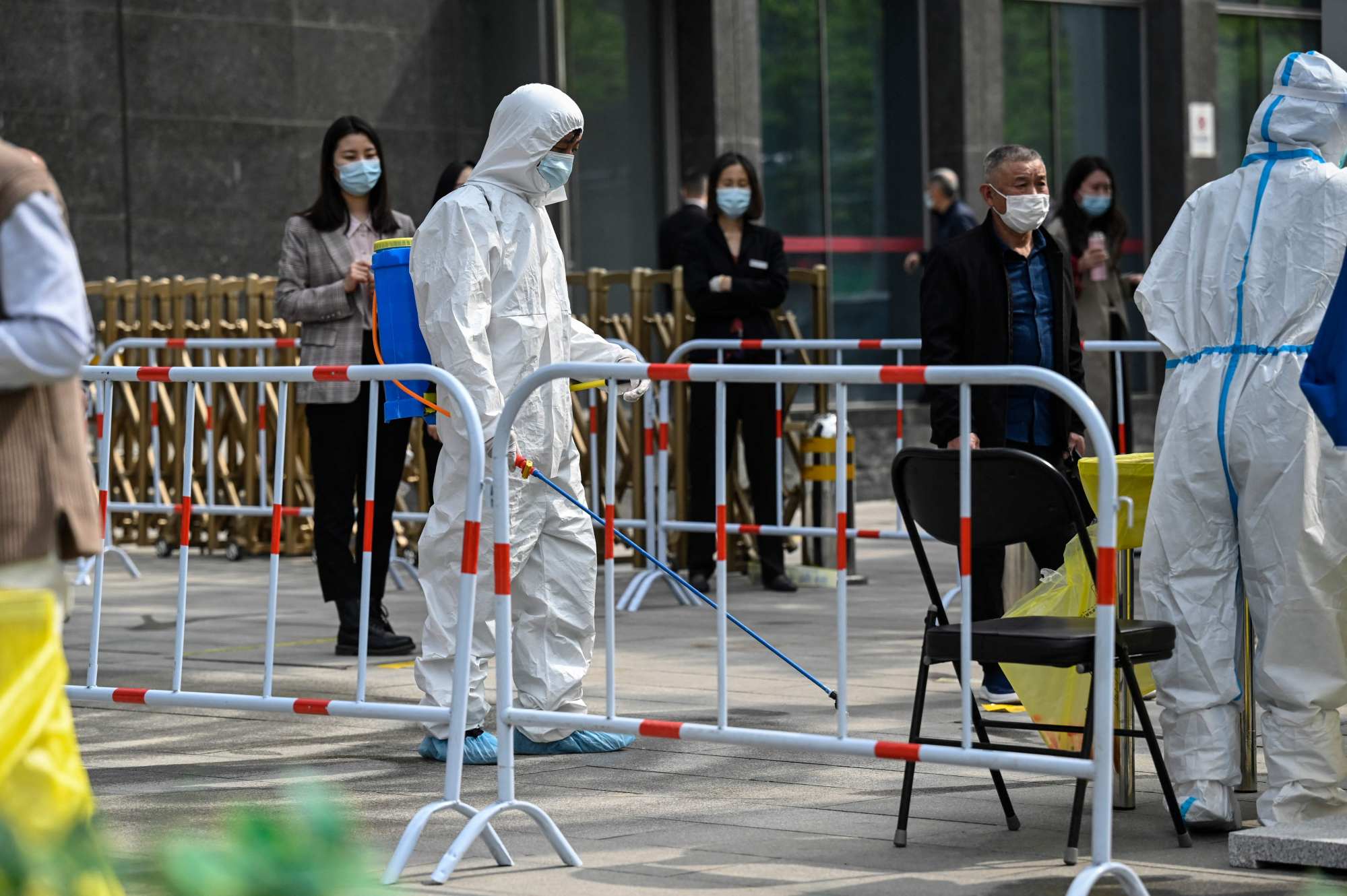
China’s harsh zero-Covid measures risk eroding trust in the rule of law
- Several Chinese legal experts have questioned the legality of forcibly removing residents who test negative from their homes and into quarantine facilities
- They warned that such measures represent an overstep of authority, dent confidence in China’s rule of law – and set back government efforts to promote it
Brooking no criticism of its harsh zero-Covid policy, either at home or abroad, China is pushing ahead with stamping out Omicron-fuelled outbreaks – and is starting to see a glimpse of the light at the end of the tunnel, judging by the latest data and official comments.
In Shanghai, where a hard citywide lockdown is entering its seventh week, almost all new cases were confined to areas under the strictest controls, officials said on Thursday, sounding a more confident tone as they confirmed the continued downward trend of the city’s total case tally – raising expectations that some resemblance of normalcy may return by June.
Beijing, meanwhile, also reported detecting most of its new cases among people under the tightest movement restrictions. The Chinese capital has been under a soft lockdown for two weeks, and from Friday its 22 million residents were asked to work from home for three days and undergo three more rounds of mandatory testing for contact tracing purposes.

If cases continue trending downwards, the Chinese government may soon declare another phasic victory – until the virus strikes again.
But its whatever-it-takes approach to suppressing outbreaks is unsustainable, and the ramifications go far beyond individuals’ hardships and inconveniences or the negative economic impacts, which seem to be the main focus of discussions at the moment.
If China abandons zero-Covid it could prove it’s better than the West
Constitutional and legal experts have expressed concerns both privately and publicly that some of the harshest control measures lack sufficient legal basis, while others are simply extralegal and represent a complete overstep of officials’ authority.
They have warned that while such measures may be effective in achieving short-term goals, their implementation dents confidence in the rule of law and sets back China’s efforts to promote it.
Rare criticism
Chinese legal experts do not often voice their concerns publicly, but several have been brave enough to speak out about the impact of certain zero-Covid measures on civil rights.
Prominent Shanghai lawyer Liu Dali has called for an investigation into the legality of measures that saw police and other officials force people into centralised quarantine facilities – even if they had tested negative – simply because a neighbour was infected.
In an open letter to the standing committee of the Shanghai people’s congress, he urged the legislative branch to review the measures and discuss ways to ensure people’s civil rights were upheld.

Neither China’s infectious diseases law nor its emergency response law have clear provisions authorising officials to remove people from their homes even if they test negative, he said, citing examples where residents had been ordered to leave without being given any official documentation.
Liu called for residents’ rights – to their homes and to access medical care – to be respected.
Online videos showing police and other officials threatening and forcibly removing people from their homes have gone viral in recent weeks, stirring anger and raising questions about the legality of such actions.
In one, an official can be heard threatening a young couple that their “three generations” – a reference to a Chinese proverb about the difficulties of maintaining multigenerational wealth – were at risk if they refused to leave their home, which was met with the defiant reply: “we will be the last generation, thank you”.
Illegal removals
In a separate open letter, Tong Zhiwei, a constitutional-studies professor at Shanghai’s East China University of Political Science and Law, said the forcible removal of residents to quarantine facilities was illegal and should be stopped. More than 20 of his peers had contributed to the letter, he said.
Tong also criticised officials who had forced residents to hand over the keys to their homes so they could be disinfected, saying that no law provides for such an action and it was tantamount to illegal trespassing.
Singapore, by comparison, sends health inspectors to break into homes suspected of housing dengue-carrying mosquitoes – but only after multiple visits have been made and a legal notice served, because of the specific laws and safeguards that the city state has introduced.
Mass disinfection has been integral to China’s antivirus efforts since the beginning of the pandemic, despite experts long questioning its efficacy and warning that it could do more harm than good.

Chinese officials are obsessed with it, however. Trucks spraying clouds of disinfectant have become a common sight in cities up and down the country over the past two years – as have teams of workers clad in protective gear sanitising streets, building fronts and the insides of people’s homes. Shanghai’s lockdown only brought the practice back into the spotlight.
Tong further pointed out that China had never declared a state of emergency in its fight against Covid-19, meaning that any Shanghai officials or organisations who used such an emergency as justification for enforcing the harshest lockdown measures lacked the legal authority to do so. According to China’s constitution, only the standing committee of the National People’s Congress or the State Council can declare national or regional emergencies.
‘It’s terrifying’: hope dims for China’s travel sector amid latest outbreak
On Wednesday, an official from Shanghai’s disease control centre reportedly rejected these criticisms and said that all administrative measures had been carried out in line with the relevant laws and regulations.
According to the latest reports, officials have started asking residents to sign a letter of consent before entering their homes for disinfection.
But the damage is already done.
Wang Xiangwei is a former editor-in-chief of the South China Morning Post. He is now based in Beijing as editorial adviser to the paper.

